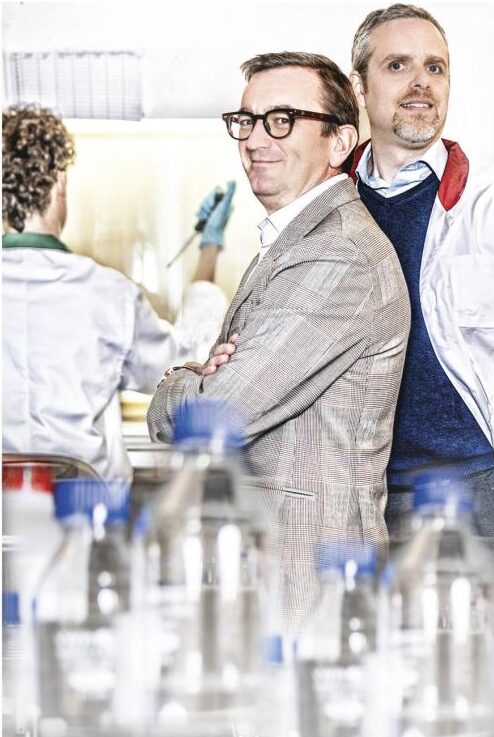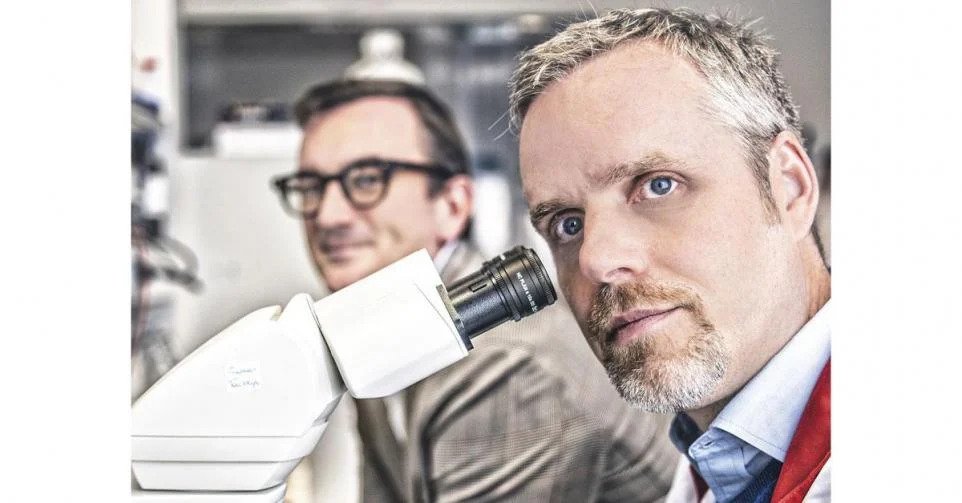It came as a shock, Bart Van Acker confesses, when he learned in early 2020 that his friend Pieter Van Vlierberghe had been told he had developed glioblastoma, a severe brain tumor. “Just a few weeks before, he had been in our company because there was a fundraising he had organized, an action for ‘Kom op tegen Kanker’ of all things. I remember him saying then that he didn’t feel so good and often had headaches. He thought that he might be overworked, on the brink of burnout, or possibly dealing with depression. His father-in-law, a doctor, recommended he get a scan. It turned out he had already developed a tumor the size of a big ping-pong ball.” Pieter Van Vlierberghe, born in 1980, died in late December 2022.
Pieter knew that he would no longer benefit from additional research, but that after him others might have a better chance of a cure inspired him'
BART VAN ACKER, QBD GROUP
Van Acker, a fast talker, shifts down a few gears when he tells the story. He had known Pieter Van Vlierberghe since high school. They became best buddies and studied bioengineering together, first in their hometown of Antwerp, then in Leuven. Not only did they sit next to each other in auditoriums, they also went cycling and playing soccer together. “If you saw Bart, you saw Pieter, and vice versa,” recalls research professor Frederik De Smet.
After their studies in Leuven, Van Vlierberghe earned his doctorate in Rotterdam and then became a researcher at Columbia University in New York. Pediatric leukemia became his specialty. His knowledge was noticed back home, and he was able to start a research group at Ghent University. “Pieter was a very smart guy. He helped hundreds of children get rid of leukemia. He was one of the top experts in his field,” Van Acker says. Van Vlierberghe has been awarded several times for his research work, including the Baillet Latour Fund prize in 2018 and a 2020 recognition from the Royal Flemish Academy of Belgium for Sciences.

Van Vlierberghe fell ill in February 2020. The tumor did turn out to be in a good spot—at the front of his head—allowing it to be removed quickly. “This is strange to say, but Pieter, before or after the surgery, was still the same Pieter: full of energy, full of plans.” However, then came COVID, which made many things impossible. “Pieter called me with the idea of doing additional research on glioblastoma. He had contacted Frederik again because he knew he was working on that. Pieter asked, ‘Can’t we do something together? Couldn’t you support or sponsor it?’ Of course, I didn’t have to think long about that,” Van Acker said.
The common thread
Van Acker founded his own company, QbD Group, a consultancy in life sciences, 12 years ago, guiding companies through the full development of their ideas into a fully-fledged drug or treatment for the patient. Through numerous acquisitions, QbD has become a sizable company with 600 employees and a dozen offices in European and South American countries. Last year, QbD accounted for sales of 60 million euros.
Frederik De Smet, like Pieter Van Vlierberghe, pursued an academic direction. After graduating in 2003, he pursued a doctorate at the VIB, Professor Peter Carmeliet’s center for cancer biology. He then moved to the United States, where he conducted research at the Dana-Farber Cancer Institute, one of Harvard’s research centers, and also at the Broad Institute in Massachusetts, founded by the creator of the Human Genome Project, where the entire structure of human DNA was unraveled. “In those fantastic places, I learned a lot and developed many skills,” says De Smet. “When the opportunity arose in Leuven to start my own research center at the department of pathology, I returned to Belgium in 2016.”
In Flanders, we have a performing biotech scene, but as academics, we don't always know what's going on there'
FREDERIK DE SMET, PROFESSOR
As with Van Vlierberghe, cancer is the common thread throughout De Smet’s research. ‘At first, it was still focused on cancer in general in the U.S. I concentrated on everything related to brain tumors. When I started in Leuven, research on brain tumors was not as advanced. Some clinicians were conducting research, but combining a clinic with neurosurgery or neuro-oncology was not at all obvious. You need people who can dedicate themselves full-time to research. We now do that here in the lab, working closely with the people at UZ.”
Faster approval
De Smet’s research focuses on glioblastoma, high-grade brain tumors. “Those are fortunately rare, but if you get the diagnosis, it’s very serious. Most patients die within one or two years; the chance of survival is less than 1 percent. About 500 people die every year from glioblastoma,” De Smet says.
The big challenge in the research is that there is a lot of variation in the tumors. “In our jargon, we call that heterogeneity. If you compare one patient to another, you see many differences at the molecular or genetic level, but they all fall under the heading of glioblastoma. The standard of care is the same for all patients. We are doing research on how to make the treatment more specific, more tailored to the patient.”
Therein lies an important snag because there are so-called clinical trials being conducted worldwide, but in order to then receive approval for that specific treatment, you must have enough patients with a positive response to the treatment or drug. Under the regulations, if the number of patients is too low, you cannot get approval from the authorities, such as the U.S. Food and Drug Administration (FDA) or the European Medicines Agency (EMA). “Because there are relatively few patients with glioblastoma, and the variation within that glioblastoma is even greater, it is very difficult to get approval for certain treatments,” De Smet clarified.

In his research, De Smet is attempting to facilitate acceleration. “We are developing methods to more precisely target existing treatments, some of which have already received approval for the treatment of other cancers, so that we can make a better selection for the patients participating in the trials. The goal is to achieve faster approval for certain treatments. This encompasses both classical chemotherapy and immunotherapy. We are developing methods with which we can estimate much better in advance which treatment can work.”
Cross-fertilization
Professor De Smet’s research center collaborates with numerous other Belgian and European centers for this purpose, but additional funding for more research is always welcome. Hence, De Smet was delighted with Pieter Van Vlierberghe and Bart Van Acker’s plan for a chair. “You should also never forget, it’s about brains, which is incredibly complex. That makes it extra difficult to take samples or samples for research. You can’t just open up the brain every week to take away some extra tissue for research,” Van Acker said.
Pieter Van Vlierberghe had been given the standard treatment, but he was very aware that it might not help, and that additional research was desperately needed. “He still responded well to radiation and chemotherapy. After diagnosis, people stay alive an average of a year and a half. With Pieter, it was almost three years,” De Smet said. “He very well knew that he would no longer benefit from additional research. It’s long-term work, but the idea that after him others might have a better chance of being cured inspired him,” Van Acker adds. “The idea of creating a chair for more research came entirely from him. At covid time, he came to my kitchen to present his idea while five people from management listened to it. I didn’t know then that Frederik was doing research on glioblastoma, but Pieter had already made contact. Two hours after his presentation, I called him to say, ‘We’re doing it!'”
Beyond the financial support, there is an additional reason De Smet is pleased with the chair, which was established in 2021. “As academics, we have a reasonable view of what’s happening in other research centers, but we don’t always know what’s going on in more commercial environments. While that cross-pollination is very important. Bart’s network is very important here. Certainly in Flanders, we have a high-performance biotech scene, but as academics, we do not always know what is happening there. We can do the most fantastic research here, but the goal is still for that to evolve into an approved drug or treatment.”
That is QbD’s raison d’être, Van Acker clarifies: “We guide small start-ups and medium-sized companies in developing their idea into a full-fledged product. In doing so, we cover the whole gamut: the regulatory, the quality, the clinical, even the commercial aspect of how to bring a product to the market. Because of the many acquisitions, we have a very broad spectrum of experts in-house, in all areas that matter. That allows you to work much more efficiently from day one on the development of a product. We are happy to put that network at the service of the chair.”
The chair is part of the QbD Foundation, the foundation that groups all of QbD’s social projects. The chair is by far the most important initiative. “The personal story has also been very decisive, that Frederik and I know each other, and that Pieter brought us together again. The first three years are ending now, but we just signed a deal for the next three years. We’re going to keep doing this, also in memory of Pieter.”
At least once a year, QbD organizes an event around the chair, Van Acker says. “That’s when Professor De Smet comes to clarify progress. Even though it is frustrating to notice how slow the research sometimes is, that’s the nature of medical research. At the event, we also invite friends and family of Pieter. It is also a tribute to him. The great thing is that this, in turn, leads to other initiatives that raise money for cancer research. For example, during the ZoniënTrail, a running race, money is raised for Frederik’s research. That is a very nice side effect of the chair.”

Did you find this news article interesting? Thanks for sharing it with your network:
